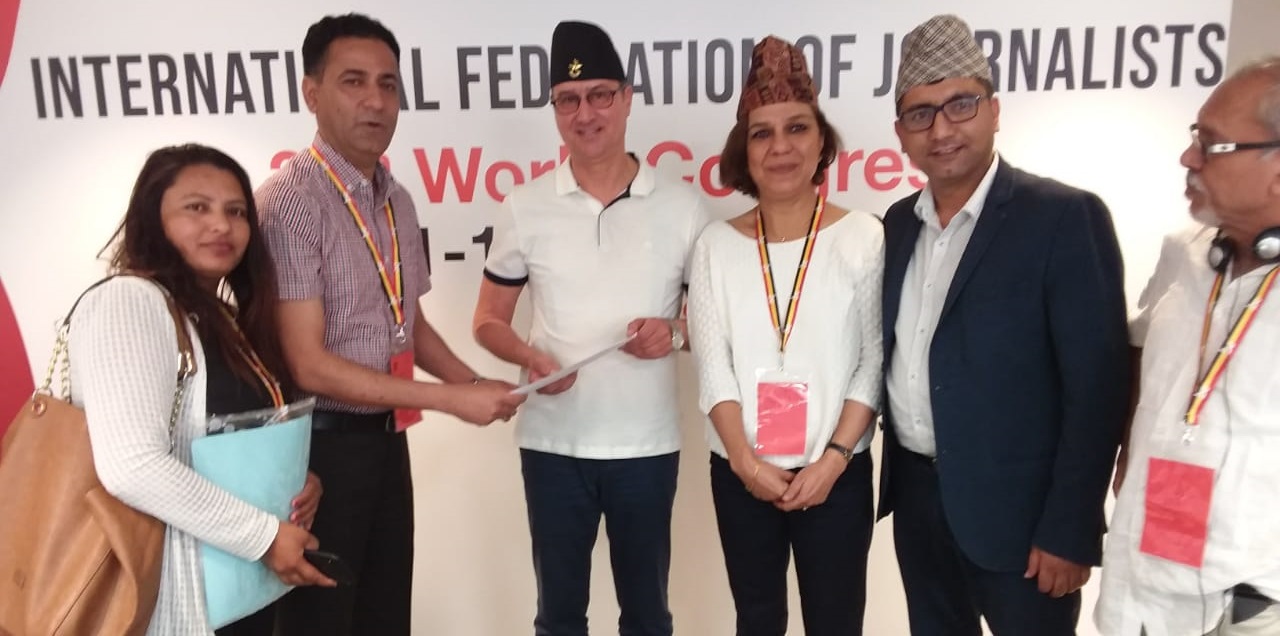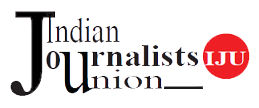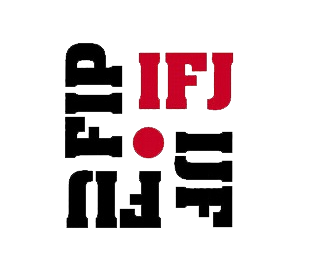Recalling that 2018 has been a deadly year for journalists with a toll of 94 lives of journalists world over as a result of their works even in democratic countries where press freedom has been seen as an essential part of civil society, IFJ Congress held at Tunis, the capital of Tunisia from June 11 to June 14, 2019 urged all its affiliates worldwide to commit themselves and their members to this cause and to promote the convention to Protect Journalists by strengthening our regular communication on the murders of journalists. The 30th Congress of IFJ was held in Tunisia, a country which clicked the 2011 Arabian spring for establishing democracy by overthrowing tyrant regimes in Arabian Peninsula to mark the role of free press in flourishing democracy.
A pre conference “Journalist Unions in the digital Age was held just before the inauguration of the congress on June 11, 2014 as the digital revolution has brought many challenges to modern day journalism. it was observed in the conference that the technological revolution has changed the way journalists work. Unions must adapt to challenges of the technological revolution if they want to remain relevant.
A new IFJ global charter of ethics for Journalists was adopted as a standard of professional conduct "for journalists engaged in gathering, transmitting, disseminating and commenting on news and information in describing events".

Delegates also backed a motion to promote the IFJ campaign for a UN convention on the Protection of Journalists and Media Professionals. The campaign was launched in response to rising anger over continued impunity in the face of increasing attacks on journalists and media professionals around the world; 95 were killed in 2018 and yet nine in ten cases remain unpunished. The conference held a march through the streets on Tunis in memory of killed colleagues, including Ireland's lyra McKee and Malta's Daphne Caruana Galizia.
IFJ condemned the arrests of journalists in Uttar Pradesh in relation to material they broadcast relating to the State's Chief Minister, Yogi Adityanath and welcomed the release of investigative Russian journalist Ivan Golunov, who had been arrested on trumped-up drug charges. His release followed an outcry by newspapers in Russia and international press organisations.
The conference passed resolutions calling for solidarity for journalists working for regimes which routinely threatened journalists and press freedom, including in Somalia, Palestine, Turkey, India, Brazil, Poland and Hungary. A motion from the Russian Union of Journalists calling for the need to fight against disinformation and fake news and to get actively involved in consultations within expert groups to expose and thwart it was supported by delegates. Around 300 journalists from across 140 countries participated in the congress of the world's largest journalists' body. The IFJ has 600,000 members from more than 180 affiliated unions in 140 countries.
IJU’s former President SN Sinha, former Secretary General K Sreenivas Reddy, Secretary General Sabina Inderjit, and Vice President Geetartha Pathak, participated in the Congress as delegates. A total 63 resolutions on various burning issues of journalism and 13 urgent resolutions on immediate pressing issues were discussed at length at the congress and all of them were adopted some unanimously and some with minor modifications.
The Indian Journalists Union moved four resolutions in the congress and all of them were carried unanimously. A resolution moved by IJU felt there was a grave threat to freedom of Press in India. the resolution expressed grave concern at the diluting of labour laws, undermining media institutions such as the Press Council of India and the Central Press Accreditation committee, non-representation of unions in accreditation committees, misusing the national security Act against journalists, particularly in the north-eastern part of India etc. second resolution moved by IJU was to support #MeToo Movement in the Media. The fourth resolution moved was on formation of a regional federation in Asia-Pacific region.
The resolution says that while regional federations are already operational within the IFJ - EFJ, FEPALC and FAJ - representing the interests of journalists' unions and their members, there is no such regional federation in the Asia Pacific. The resolution pointed out that the IFJ constitution encouraged the formation of regional federations. Paragraph 28 section IX states: "continental and regional groups may be set up by affiliate and associate members of the Federation. Such groups may regulate their own activities provided they are in accordance with this constitution and are consistent with policies established by congress. this region has 32 affiliates and covers east Asia, south Asia, South East Asia, Oceania and Pacific islands; as at the same time, it is very diverse in respect of political system, culture, social background, religion, the media situation, understanding of liberal democracy, etc. the resolution appealed the affiliates to push for formation of a regional federation citing that the IFJ Executive Committee held in Taipei has supported the establishment of such a group.
The important urgent motions moved in the IFJ congress were on indictment filed by the US government against Wikileaks founder Julian Assange, decision of New York Times international on 10 June 2019 to end all daily political cartoons, against the unilateral coercive sanctions imposed by the United States and European Union countries in violation of international laws and norms that restricts the Syrian media to modernize their equipment and import modern technology etc.
The World Congress marked the Centenary of the foundation of the International Labour Organisation (ILO). The founding principle of ILO: that universal, lasting peace can be established only if it is based on social justice is as relevant today as they were 100 years ago. ILO was born out of a desire for global peace in the aftermath of World War I. In celebrating the centenary, the IFJ Congress notes with alarm the growing threat to social justice from the rise of extreme right parties and those who seek to undermine human rights, including the rights of all workers. Samim Sultana Ahmed of IJU and President, Gender Council of Journalists Union of Assam (JUA), a State affiliate of IJU has been elected as one of the members of the Steering Committee of IFJ Gender Council. IJU Vice President Geetartha Pathak has been elected member of working group for South Asia affairs of IFJ Asia Pacific.
In the sidelines of the Congress, the IJU also inked a Memorandum of Understanding (MOU) with Mongolian Journalists Union for mutual co-operation for the benefit of working journalists in both the countries. The two also agreed to share experiences and exchange delegations between both the countries.




